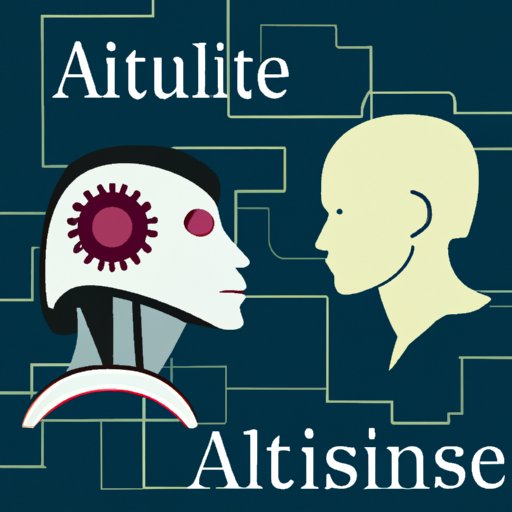Introduction
Artificial intelligence (AI) has become increasingly prominent in today’s society, with applications ranging from healthcare and finance to transportation and entertainment. Despite its potential to improve our lives, many people are concerned about the potential dangers of AI. This article will explore the potential threats posed by AI, from its negative impacts on society to the ethical dilemmas it presents.

Exploring the Potential Dangers of Artificial Intelligence
When discussing the potential dangers of AI, one must consider the various ways in which it can be used for malicious purposes. In recent years, researchers have warned of the possibility of “malicious use of AI systems”, such as automated hacking tools and social engineering bots. For example, a 2017 report from the Future of Humanity Institute at Oxford University warned that “automated hacking tools could scan and exploit millions of computers more quickly than any human could manage”.
Another potential danger of AI is its potential to disrupt society. According to a 2020 study conducted by McKinsey & Company, “automation could displace up to 25 million jobs in the United States by 2030”. This could lead to an increase in economic inequality, as those who are already disadvantaged are likely to be disproportionately affected. Furthermore, the study found that “automation could also lead to a decrease in wages across all income levels”, further exacerbating the problem.
In addition to these potential dangers, there are also concerns about the risks posed by unregulated AI development. As AI systems become increasingly complex, it becomes more difficult to predict their behavior, which could lead to unexpected outcomes. For example, researchers have warned that “unregulated AI development could lead to the creation of autonomous weapons systems, which could be used to commit mass atrocities without human oversight”.
Assessing the Threats of Autonomous Machines
The ethical implications of AI are another area of concern. As AI systems become more advanced, they will increasingly be tasked with making decisions that have moral or ethical implications. For example, autonomous vehicles will need to make decisions about how to prioritize safety in situations where a crash is inevitable. These kinds of decisions raise difficult questions about who should be held accountable if something goes wrong.
Furthermore, AI systems could potentially be used to violate human rights. For example, facial recognition technology has been used to target political dissidents and monitor minority populations. Similarly, AI-powered predictive policing algorithms have been criticized for perpetuating racial bias in law enforcement. These examples demonstrate the need for greater regulation of AI to ensure that it is not used to violate human rights.
Conclusion
In conclusion, AI poses a number of potential dangers to society, from its potential to be used for malicious purposes to the ethical dilemmas it presents. There is also the risk of unregulated AI development leading to unexpected outcomes, as well as the threat of autonomous machines violating human rights. To mitigate these risks, it is essential to ensure that AI is developed responsibly and regulated appropriately.
In summary, this article has explored the potential dangers of artificial intelligence (AI). By examining the negative impact of AI on society, investigating the possibility of AI being used for malicious purposes, and analyzing the risks of unregulated AI development, it has highlighted the need for responsible development and effective regulation. Ultimately, only through greater understanding and conscientious management can we ensure that AI is used for the benefit of humanity.
(Note: Is this article not meeting your expectations? Do you have knowledge or insights to share? Unlock new opportunities and expand your reach by joining our authors team. Click Registration to join us and share your expertise with our readers.)
